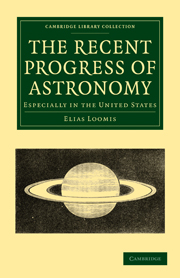Book contents
- Frontmatter
- PREFACE
- Contents
- CHAPTER I RECENT ADDITIONS TO OUR KNOWLEDGE OF THE PLANETARY SYSTEM
- CHAPTER II RECENT ADDITIONS TO OUR KNOWLEDGE OF COMETS
- CHAPTER III ADDITIONS TO OUR KNOWLEDGE OF FIXED STARS AND NEBULÆ
- CHAPTER IV PROGRESS OF ASTRONOMY IN THE UNITED STATES
- SECTION I
- SECTION II
- SECTION III
- SECTION IV
- SECTION V
- SECTION VI
- POSTSCRIPT
- Frontmatter
- PREFACE
- Contents
- CHAPTER I RECENT ADDITIONS TO OUR KNOWLEDGE OF THE PLANETARY SYSTEM
- CHAPTER II RECENT ADDITIONS TO OUR KNOWLEDGE OF COMETS
- CHAPTER III ADDITIONS TO OUR KNOWLEDGE OF FIXED STARS AND NEBULÆ
- CHAPTER IV PROGRESS OF ASTRONOMY IN THE UNITED STATES
- SECTION I
- SECTION II
- SECTION III
- SECTION IV
- SECTION V
- SECTION VI
- POSTSCRIPT
Summary
In 1839, Professor Morse suggested to M. Arago, that the electric telegraph would afford the means of determining the difference of longitude between distant places with an accuracy hitherto unattainable.
The first practical application of this method was made by Captain Charles Wilkes, in June, 1844, between Washington and Baltimore. Captain Wilkes conducted the experiments at Washington, and Lieutenant Eld at Baltimore. Two chronometers, previously rated by astronomical observations in the vicinity, were brought to the two telegraph offices, and were compared together through the medium of the ear, without coincidence of beats. The comparisons of the chronometers were continued for three days, and the results indicated that the Battle Monument at Baltimore was 1m. 34.87s. east of the Capitol. This method will furnish differences of longitude with a precision greater than any method hitherto practiced; but it is susceptible of great improvements.
In the year 1845, a plan was adopted by Professor A. D. Bache, Superintendent of the Coast Survey, to apply this method in an improved form, to the determination of the difference of longitude between the principal stations of the survey; and in 1846 measures were taken to connect in this manner Washington, Philadelphia, and New York. An arrangement was made with the telegraph company, to allow the use of their line for scientific purposes, after the usual business operations had closed for the day.
- Type
- Chapter
- Information
- The Recent Progress of AstronomyEspecially in the United States, pp. 304 - 367Publisher: Cambridge University PressPrint publication year: 2010First published in: 1856



